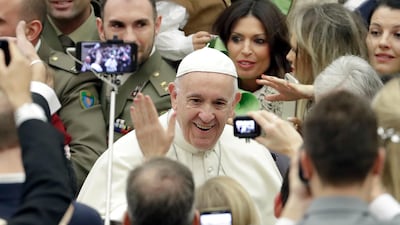For Roman Catholics every pope is infallible in his teachings, even if the incumbent takes a sharply different view from his immediate predecessor.
In Pope Francis, the current bishop of Rome, that observation is certainly true when it comes to the Christian church’s relationship with Islam. The Argentinian-born prelate draws sharp contrast to Pope Benedict, the retired Pope emeritus, when addressing this important relationship.
In his upcoming three-day visit to the UAE in February, Pope Francis is expected to double down on his promotion of tolerance and understanding between Christians and Muslims, a continuation of his outreach to Muslim communities around the world.
During a visit to Egypt in 2017, Pope Francis was clear on the need to stand up to extremism. He condemned the “idolatrous caricatures of God” that underlies violent ideologies.
“Let us say once more a firm and clear 'No!' to every form of violence, vengeance and hatred carried out in the name of religion or in the name of God," Pope Francis said. "Together let us affirm the incompatibility of violence and faith, belief and hatred.
"It is our duty to dismantle deadly ideas and extremist ideologies, while upholding the incompatibility of faith and violence, God and acts of murder."
It was a warm and engaged pope who spoke at Al Azhar, the Cairo religious institution and university, founded in the 10th century and respected throughout Islam.
The more Pope Francis speaks on inter-faith tolerance, the clearer the contrast becomes between his approach and that of his predecessor.
Speaking at Regensburg in Germany in 2006, Pope Benedict angered Muslims by echoing the language of a 14th century Christian emperor on Islam.
In contrast, Pope Francis is widely respected for his personal bravery and iconoclastic approach to what some occupants have treated as a princely position. The trip to Egypt came less than three weeks after a bomb attack on Christians had killed 45. Yet he eschewed a bullet-proof vehicle and addressed an open-air stadium.
"Whereas previous popes — even in more secure places — have ridden in bulletproof vehicles, Francis showed his courage in Egypt, and his will to be close to the people, by this simple gesture," Gabriel Said Reynolds, a professor of Islamic studies at the University of Notre Dame said at the time.
All told, Francis has so-far visited seven Muslim majority countries in his papacy and has spoken of his determination to “cross-over” to the other side many times.
In Rome, the 80-year old lives in a guesthouse in Vatican City, not the ornate papal apartments overlooking St Peter’s Square. He is also driven around in a mid-market Fiat that blends inconspicuously with the traffic.
On issues of climate change and social justice, Francis, formerly named Jorge Mario Bergoglio, proclaims a radical programme of support for the poor that is in keeping with the traditions of his Jesuit order. One of the controversies of his papacies lies in that he is the first pope from the missionary Jesuits.
Increasing criticism of his handling of the challenge of reforming the Church has been heard, especially among Catholics. Leading figures in the church have been forced to resign or face charges of cover-ups, including Cardinal Theodore McCormick, the former archbishop of Washington and Cardinal George Pell, once the third ranking member of the Vatican hierarchy.
_________________
Read more:
The Pope's visit: The story of the Roman Catholic Church in the UAE
Pope Francis to make landmark visit to UAE
When Sheikh Mohamed bin Zayed met Pope Francis at the Vatican back in 2016 - in pictures
_________________
The so-called VatiLeaks revelations rocked Pope Francis by showing infighting and corruption in Vatican ranks, but no firm effort to purge the establishment has taken place.
Much of the dissent is confined within small pockets of Catholicism. For the bulk of the faithful, Francis is a man for the times and able to address populist political pressures, speaking of the need not to build “walls but bridges” on a trip to Donald Trump’s America last year.
A veteran of Argentina’s dirty war and 1970s dictatorship, Pope Francis is well aware of the deft balancing act the papacy requires.

